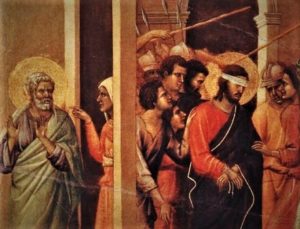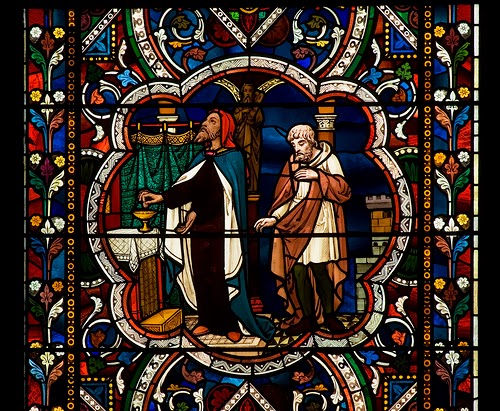With Our Chins Up (Part 2)
We can see why discouragement is a prelude to despair; when left unchecked, discouragement casts a heaviness upon our occupations, turns us in upon ourselves, closes us off to the charity of others, heightens suspicion, and is ultimately played out by a systematic “giving up” on what was once held as important.

This is why it is so useful to the devil, as described in the story in Part 1 on Monday, especially when one is actually making advances that God keeps us from seeing.
Discouragement that takes root (and that can happen subtly) wreaks havoc upon a well-fortified house, inviting the thief to rob it brick by brick until no house remains: driving a wedge into the soul, prayer slowly becomes mechanical and the temptation sets in to abandon it for more “useful things”. The gifts of God, once recognized as such, become intolerable burdens. A heightened fear of failure causes good works undertaken to go undone. Generosity withers, cynicism increases, penance is considered repression, escapes replace good recreation, and, in later stages, what had been a well-formed conscience is now considered a fit of misplaced piety or even scrupulosity.
 God is, at best, distant, and His apparent “failures” leave the soul in an awkward state of uncertainty about what it believes, perhaps even angry, sort of like St. Peter hiding himself in a far-off corner of the courtyard while Christ was undergoing trial.
God is, at best, distant, and His apparent “failures” leave the soul in an awkward state of uncertainty about what it believes, perhaps even angry, sort of like St. Peter hiding himself in a far-off corner of the courtyard while Christ was undergoing trial.
Interestingly enough, Our Lord’s parable on the Pharisee and the publican can provide a game plan on how to deal with discouragement (cf. Lk. 18:10-14).
Wounded pride is often at the basis of any discouragement that is able to take root and sap our soul with its parasitic qualities. By the time the publican begins his prayer in a far-off corner of the Temple, he was already labeled as below the rest of men and was called an extortioner, unjust, adulterer by the Pharisee, who really is just a model for a worldly spirit that utilizes religion for selfish motives.
But are we not all really in some way extortioners, unjust, or adulterers?
Extortioners in that we claim for ourselves what rightly belongs to God, unjust by using God’s gifts for selfish purposes, adulterers by loving created things more than God, whom we should love above all things?
This is how we stack up against the greatness of God, and what grounds for discouragement we have if it was not for His boundless mercy and love! How does the publican get it? Why does he walk away with the favor of God?
Ven. Fulton Sheen writes: “Many in heaven were once alcoholics, adulterers, thieves, racketeers, but there is no one in heaven who did not become humble.”

Observe the stance the publican takes and why it serves as a most effective remedy against the discouragement the devil just loves. While the Pharisee, by his attitude and words, insults his neighbors and offends God, the publican, by hiding himself from the sight of men and casting down his eyes, acknowledges his condition before God, and regards the gift it is to simply be in God’s presence, that it is from the goodness of God that we exist to begin with, and from that we owe Him all we have.
By taking a low place in the temple, the publican shows that he is completely dependent on God for everything, that he considers nothing as an entitlement, and that his sole hope and strength must always be placed in God, trusting in His ways, which will utilize various circumstances for the greatest accomplishment of good.
And in his plea for mercy, the publican brings before God what needs to be talked about, where he senses his greatest debt, where his limitations bear their greatest weight. Also, by striking his breast, he indicates the courage and willingness to do what it takes to make things right, to trust in the plan God has. All the things then that discouragement carries with it, this publican counteracts by his action: the prayer is heartfelt and repeated; the work ahead, though difficult perhaps, becomes an act of love and service; failure is of little concern because he trusts in God’s ways and not the judgment of men; this inspires generosity, and by returning home, he sought no escape.
Finally, God is not blamed when things go wrong. Rather, a modest and confident trust is placed in God’s promise to never despise the contrite and humble of heart.
January 20, 2021








